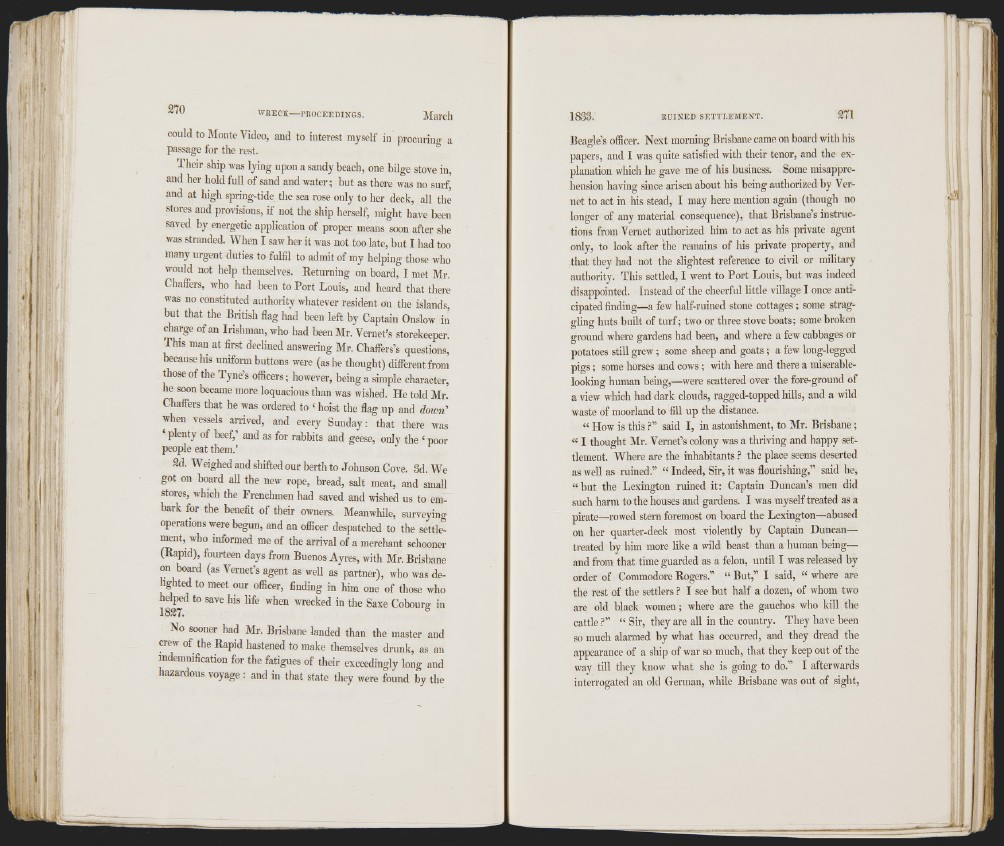
^ f •
I-;',-::
711.
f ri i
! '01
! fi
270 WRECK PROCEEDINGS. March
could to Monte Video, and to interest myself in procurino- a
passage for the rest. “
Then- ship was lying upon a sandy heacli, one hilge stove in,
and her hold full of sand and water; hut as there was no surf,
and at high spring-tide the sea rose only to her deck, all thè
stores and provisions, if not the ship herself, might have been
saved by energetic application of proper means soon after she
was stranded. When I saw her it was not too late, but I had too
many urgent duties to fulfil to admit of my helping those wlio
would not help themselves. Returning on hoard, I met Mr.
Chaffers, who had heen to Port Louis, and heard that tlierè
was no constituted authority whatever resident on the islands,
hut that the British flag had been left hy Captain Onslow iè
charge of an Irishman, who had heen Mr. Vernet’s storekeeper.
This man at first declined answering Mr. Chaffers’s questions,
hecause his uniform buttons were (as he thought) different from
those of the Tyne’s officers; however, being a simple character,
he soon became more loquacious than was wished. He told Mr.
Chaffers that he was ordered to ‘ hoist the flag up and down'
when vessels arrived, and every Sunday: that there was
‘ plenty of beef,’ and as for rabbits and geese, only the ‘ poor
people eat them.’
2d. Weighed and shifted our berth to Johnson Cove. 3d. We
got on board all the new rope, bread, salt meat, and small
stores, which the Frenchmen had saved and wished us to embark
for the benefit of their owners. Meanwhile, surveying
operations were begun, and an officer despatched to the settlt^
ment, who informed me of the arrival of a merchant schooner
(Rapid), fourteen days from Buenos Ayres, with Mr. Brisbane
on board (as Vernet’s agent as well as partner), who was delighted
to meet our officer, finding in him one of those who
helped to save his life when wrecked in the Saxe Cobourg in
1827.
No sooner had Mr. Brisbane landed than the master and
crew of the Rapid hastened to make themselves drunk, as an
indemnification for the fatigues of their exceedingly long and
hazardous voyage : and in that state they were found by the
1833. RUINED SETTLEMENT. 271
Beagle’s officer. Next morning Brisbane came on board with his
papers, and I was quite satisfied with their tenor, and the explanation
which he gave me of his business. Some misapprehension
having since arisen about his being authorized by Vernet
to act in his stead, I may here mention again (though no
longer of any material consequence), that Brisbane’s instructions
from Vernet authorized him to act as his private agent
only, to look after the remains of his private property, and
that they had not the slightest reference to civil or military
authority. This settled, I went to Port Louis, but was indeed
disappointed. Instead of the cheerful little village I once anticipated
finding—a few half-ruined stone cottages ; some straggling
huts built of tu rf; two or three stove boats; some broken
ground where gardens had been, and where a few cabbages or
potatoes still grew; some sheep and goats ; a few long-legged
pigs; some horses and cows ; with here and there a miserable-
looking human being,—were scattered over the fore-ground of
a view which had dark clouds, ragged-topped hills, and a wild
waste of moorland to fill up the distance.
“ How is this .?” said I, in astonishment, to Mr. Brisbane ;
“ I thought Mr. Vernet’s colony was a thriving and happy settlement.
Where are the inhabitants ? the place seems deserted
as well as mined.” “ Indeed, Sir, it was flourishing,” said he,
“ but the Lexington ruined it: Captain Duncan’s men did
such harm to the houses and gardens. I was myself treated as a
pirate—rowed stern foremost on board the Lexington—abused
on her quarter-deck most violently by Captain Duncan—
treated by him more like a wild beast than a human being—
and from that time guarded as a felon, until I was released by
order of Commodore Rogers.” “ But,” I said, “ where ai-e
the rest of the settlers ? I see but half a dozen, of whom two
are old black women ; where are the gauchos who kill the
cattle ?” “ Sir, they are all in the country. They have been
so much alarmed by what has occurred, and they dread the
appearance of a ship of war so much, that they keep out of the
way till they know what she is going to do.” I afterwards
interrogated an old German, while Brisbane was out of sight.
! i